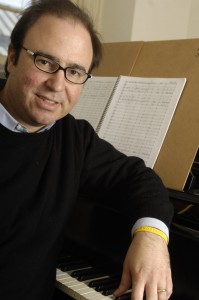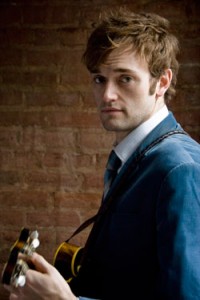The San Francisco Electronic Music Festival celebrates its 10th anniversary this week. On the final festival night, Saturday, September 19th, the program will include a special all-electronic performance of the opera I, Norton, by San Francisco Bay Area composer Gino Robair.
I, Norton is based on the proclamations of Norton I, Emperor of the United States and Protector of Mexico, who lived during the Gold Rush era in San Francisco. The concert begins at 8:00 p.m. at the Brava Theater Center, 2781 24th Street, San Francisco. Tickets are available online from Brown Paper Tickets.
 Gino Robair has created music for dance, theater, gamelan orchestra, radio, and television. His works have been performed throughout North America, Europe, and Japan. He was composer in residence with the California Shakespeare Festival for five years and served as music director for the CBS animated series The Twisted Tales of Felix the Cat. His commercial work includes themes for the MTV and Comedy Central cable networks. Robair is also one of the “25 innovative percussionists” included in the book Percussion Profiles (SoundWorld, 2001). He has recorded with Tom Waits, Anthony Braxton, Terry Riley, Lou Harrison, John Butcher, Derek Bailey, Peter Kowald, Otomo Yoshihide, the ROVA Saxophone Quartet, and Eugene Chadbourne, among many others. He is a founding member of the Splatter Trio and the heavy metal band Pink Mountain. In addition, he runs Rastascan Records, a label devoted to creative music.
Gino Robair has created music for dance, theater, gamelan orchestra, radio, and television. His works have been performed throughout North America, Europe, and Japan. He was composer in residence with the California Shakespeare Festival for five years and served as music director for the CBS animated series The Twisted Tales of Felix the Cat. His commercial work includes themes for the MTV and Comedy Central cable networks. Robair is also one of the “25 innovative percussionists” included in the book Percussion Profiles (SoundWorld, 2001). He has recorded with Tom Waits, Anthony Braxton, Terry Riley, Lou Harrison, John Butcher, Derek Bailey, Peter Kowald, Otomo Yoshihide, the ROVA Saxophone Quartet, and Eugene Chadbourne, among many others. He is a founding member of the Splatter Trio and the heavy metal band Pink Mountain. In addition, he runs Rastascan Records, a label devoted to creative music.
S21: His Imperial Majesty Norton I, Emperor of the United States and Protector of Mexico, is an “only in San Francisco” kind of personage. What inspired you to make him into the central character of an opera?
GR: He’s the kind of complex character one needs for an opera. And I like the fact that he’s mythologized somewhat.
Although many people see him as this incoherent, homeless vagrant, I think the reality is that he was bright man who was determined to make a difference in a world that was hostile, confusing, and often out of control. We’re talking about the Old West, here!
Remember, he was a Jewish immigrant from South Africa. Try to imagine the culture shock he experienced arriving in mid-19th-century California during the Gold Rush. It makes total sense to me that he’d conclude that the only way to solve the problems in his new environment was to roll up his shirt sleeves and do the job himself.
(more…)
 Our New York based readers may want to check out the opening concert of Archipelago, the new concert series by New Amsterdam Records, at Galapagos Art Space in Brooklyn. It’s this Friday, September 25th, and will feature performances by violist Nadia Sirota and percussion quartet Line C3. Music by Nico Muhly, David T. Little, and Carl Schimmel, with premieres of pieces by Marcos Balter and Our Lady J.
Our New York based readers may want to check out the opening concert of Archipelago, the new concert series by New Amsterdam Records, at Galapagos Art Space in Brooklyn. It’s this Friday, September 25th, and will feature performances by violist Nadia Sirota and percussion quartet Line C3. Music by Nico Muhly, David T. Little, and Carl Schimmel, with premieres of pieces by Marcos Balter and Our Lady J.
 Wasn’t it just a couple weeks ago we were
Wasn’t it just a couple weeks ago we were  Leon Kirchner died today after a long illness.
Leon Kirchner died today after a long illness. 
![Ted Hearne [photo: patricia werner leanse]](http://www.muziekcentrumnederland.nl/typo3temp/pics/873bd67a78.jpg) Bit of a streak for American composers: this time last year we were congratulating
Bit of a streak for American composers: this time last year we were congratulating 
 Gino Robair has created music for dance, theater, gamelan orchestra, radio, and television. His works have been performed throughout North America, Europe, and Japan. He was composer in residence with the California Shakespeare Festival for five years and served as music director for the CBS animated series The Twisted Tales of Felix the Cat. His commercial work includes themes for the MTV and Comedy Central cable networks. Robair is also one of the “25 innovative percussionists” included in the book Percussion Profiles (SoundWorld, 2001). He has recorded with Tom Waits, Anthony Braxton, Terry Riley, Lou Harrison, John Butcher, Derek Bailey, Peter Kowald, Otomo Yoshihide, the ROVA Saxophone Quartet, and Eugene Chadbourne, among many others. He is a founding member of the Splatter Trio and the heavy metal band Pink Mountain. In addition, he runs Rastascan Records, a label devoted to creative music.
Gino Robair has created music for dance, theater, gamelan orchestra, radio, and television. His works have been performed throughout North America, Europe, and Japan. He was composer in residence with the California Shakespeare Festival for five years and served as music director for the CBS animated series The Twisted Tales of Felix the Cat. His commercial work includes themes for the MTV and Comedy Central cable networks. Robair is also one of the “25 innovative percussionists” included in the book Percussion Profiles (SoundWorld, 2001). He has recorded with Tom Waits, Anthony Braxton, Terry Riley, Lou Harrison, John Butcher, Derek Bailey, Peter Kowald, Otomo Yoshihide, the ROVA Saxophone Quartet, and Eugene Chadbourne, among many others. He is a founding member of the Splatter Trio and the heavy metal band Pink Mountain. In addition, he runs Rastascan Records, a label devoted to creative music. The New York Times
The New York Times  It doesn’t seem all that long ago that I heard the world premiere of Blind Leaving the Blind. (Read about it here:
It doesn’t seem all that long ago that I heard the world premiere of Blind Leaving the Blind. (Read about it here: